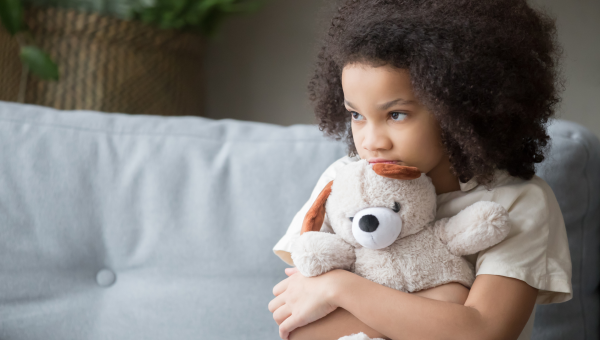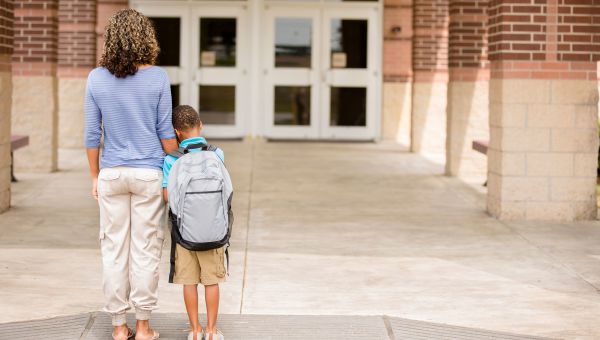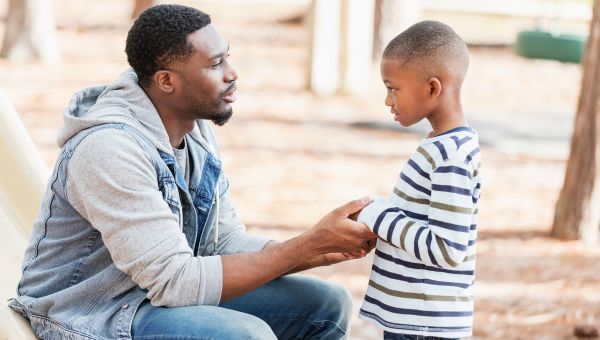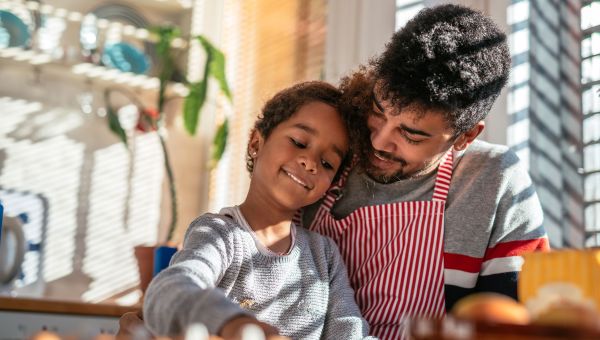6 ways to soothe an anxious child
Learn how to recignize and manage anxiety in children so they can feel better.
Updated on December 4, 2024

Anxiety disorders can affect children as well as adults. About 1 in 10 children and teens are affected by anxiety disorders, according the Centers for Disease Control and Prevention (CDC). With teenagers, the number is much higher, affecting about 1 in 3 teens ages 13 to 18.
Anxiety can often occur with other conditions, like eating disorders or depression. It can raise a child’s risk of poor academic performance and, in some cases, substance abuse.
Spotting the signs of these conditions is the first step in getting help. Here are common signs and treatment options for anxiety, plus ways parents and guardians can help anxious children.

Spot the signs
When kids are experiencing anxiety, they may express it clearly in words, or they may show it in nonverbal ways. Signs of anxiety in a child may include frequent crying, tantrums, anger, restlessness, difficulty focusing or sitting still, and refusing to do certain things, such as go to school.
They may also show physical symptoms, such as an upset stomach, aches and pains, headaches, appetite issues, trouble sleeping, and using the bathroom often. If a child has panic disorder, they’ll experience repeated sudden and unexpected panic attacks that may involve difficulty breathing, feeling dizzy, and a racing heart.
If any of these symptoms are moderate or short-lived, they may be part of the normal process of growing up. They may also be part of a separate health issue or medical condition. It’s important to seek an evaluation with HCP if your child is exhibiting these symptoms—especially if they are severe, don’t go away, or affect day-to-day life.

Determine the cause
Knowing what is making your child feel anxious is important. It can help you help them overcome their anxiety. Causes of stress can vary, and different age groups have different typical stressors. Young children may feel anxious about being left alone, or they might fear imaginary things.
Common triggers for older children include academics, social situations, or bullying. Knowing the primary cause of your young one's mental anguish can help parents understand when and how to intervene or seek professional help, if needed.
A child who is not able to speak to or in front of others may have social anxiety. If a child has an extreme fear of something specific, like dogs, they may have a phobia. Some kids worry about what’s going to happen next in life, a sign of general anxiety. Major changes like divorce or a big move can also spark anxiety.
A healthcare professional (HCP) can evaluate these triggers to help determine a course of treatment for a child.

Take steps to manage adult stress
Parents can help an anxious child by better managing their own anxiety. The way we react to anxiety and stress are partially learned behaviors and it’s only natural for kids to pick up on the actions of their parents.
“Children often look to parents to find some recourse into what they’re feeling," says Mustafa Pirzada, MD, a psychiatrist in Boca Raton, Florida. "If they have anxious parents, the child will learn that the response to that particular situation is one of anxiety,” he adds. Showing self-compassion and handling stress in positive ways can teach children they are capable of managing their stress and anxiety in a productive manner, too.
Some helpful stress management techniques include exercise, meditation, taking a break from stressors, and laughing a little.

Talk to kids about their feelings
An important way to treat a child’s anxiety is communication. Kids with anxiety often become withdrawn. If you’ve noticed your child is isolating, it’s important to open communication, and let them know they can discuss their fears or anxieties.
“If parents notice a rapid change in their child’s behavior, especially if there's a decline in their social functioning or their academic performance, they need to discuss what may be happening,” Dr. Pirzada says.
When a child is sharing anxious feelings or thoughts, try to stay as calm as possible. Aim to be flexible, making room for their feelings even if it’s inconvenient in the situation. Avoid punishing them if they make mistakes when they’re anxious or can’t conquer a fear. And when they’re able to take some small steps toward doing something that frightens them, offer recognition and praise.
Talking with a child also provides the opportunity to teach coping strategies, like relaxation techniques and breathing exercises.

Try to get your child involved
Creating situations for your children to interact with other kids can help them cope with anxiety. “Getting kids involved in social activities like groups, clubs, organizations, and sports in school is very important,” Pirzada says. “Keeping children active, happy, and social can help them avoid sources of anxiety like bullying, drugs, sexting, cyber bullying, social media, or television.”
Encourage your kids to join sports and activities, as creating a routine may be helpful for managing anxiety. Be sure to ask kids what other activities or clubs sound fun or interesting so they are motivated and happy to participate.

Recognize fears, but don't always give in to them
Try to avoid giving your children a reason to be worried. Using your words, tone of voice, and body language, recognize your child’s fears, but don’t reinforce them. Let your child know you understand their fear and that it’s okay to be afraid—but that they doesn’t have to be.
When you talk with your child about their fears, try to focus on open-ended questions. Avoid direct questions about the object of their fear, like, “Are you anxious about seeing your friend’s dog when you visit?” Instead, ask, “How are you feeling about visiting your friend’s house?”
Even though it’s tempting, try to avoid promising them that their fear is unfounded. Instead of saying, “Nothing bad will happen,” you can both validate their feelings and emphasize their strength and coping skills by saying, “Even though you feel scared, I know you’re brave and can handle the situation.”

Centers for Disease Control and Prevention. Anxiety and depression in children: Get the facts. Page last reviewed March 8, 2023.
Anxiety & Depression Association of America. Anxiety Disorders - Facts & Statistics. Page accessed February 24, 2024.
Cleveland Clinic. Anxiety in Children. Page last reviewed October 11, 2023.
Centers for Disease Control and Prevention. Anxiety and depression in children. Page last reviewed July 25, 2023.
National Institute of Mental Health. Child and Adolescent Mental Health. Page last reviewed March 2023.
The Nemours Foundation. Childhood Fears and Worries. Page last reviewed September 2023.
La Charite J, Macinko J, Hedrick R, et al. Extracurricular Activities, Child and Caregiver Mental Health, and Parental Aggravation-A National Cross-Sectional Study. Acad Pediatr. 2023 Sep-Oct;23(7):1394-1402.
Berman, Grace. “10 Tips for Parenting Anxious Kids.” Child Mind Institute. Page last updated January 29, 2024.
More On


video

article

slideshow


video


video
